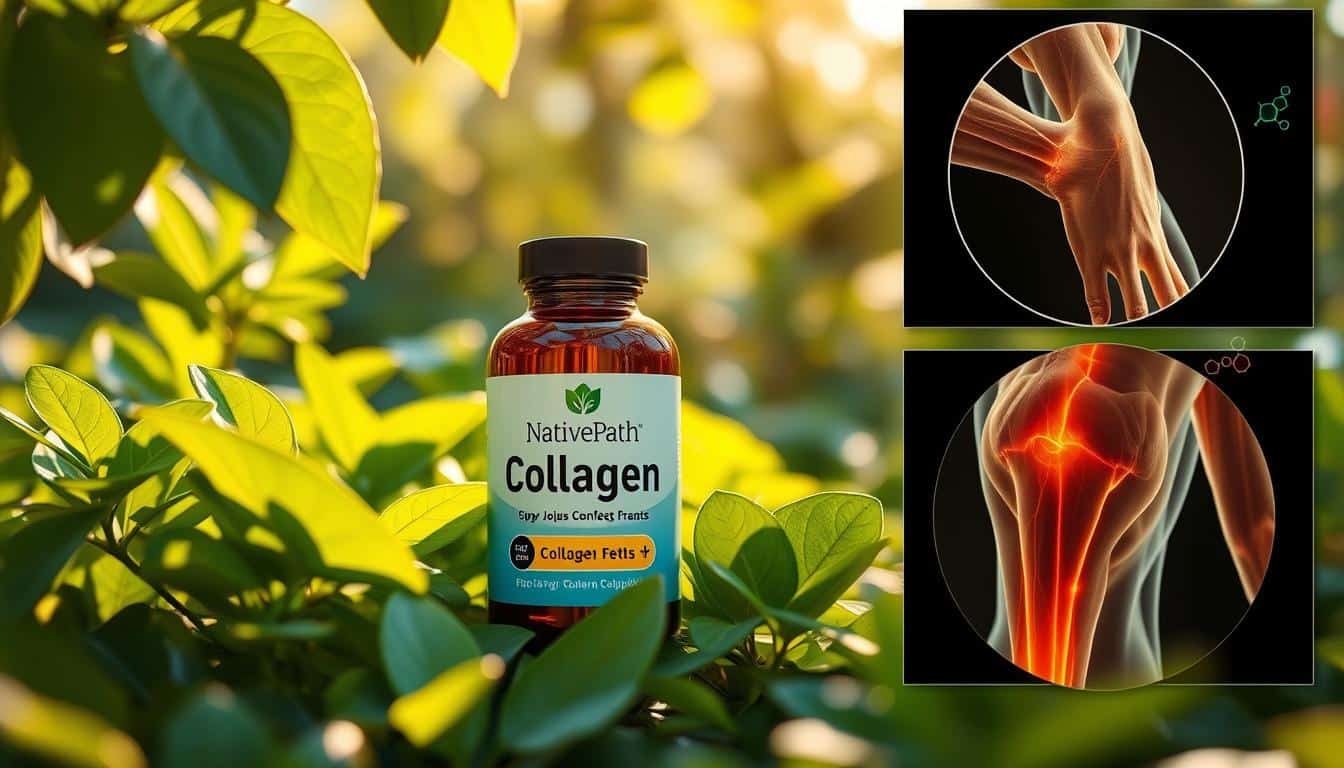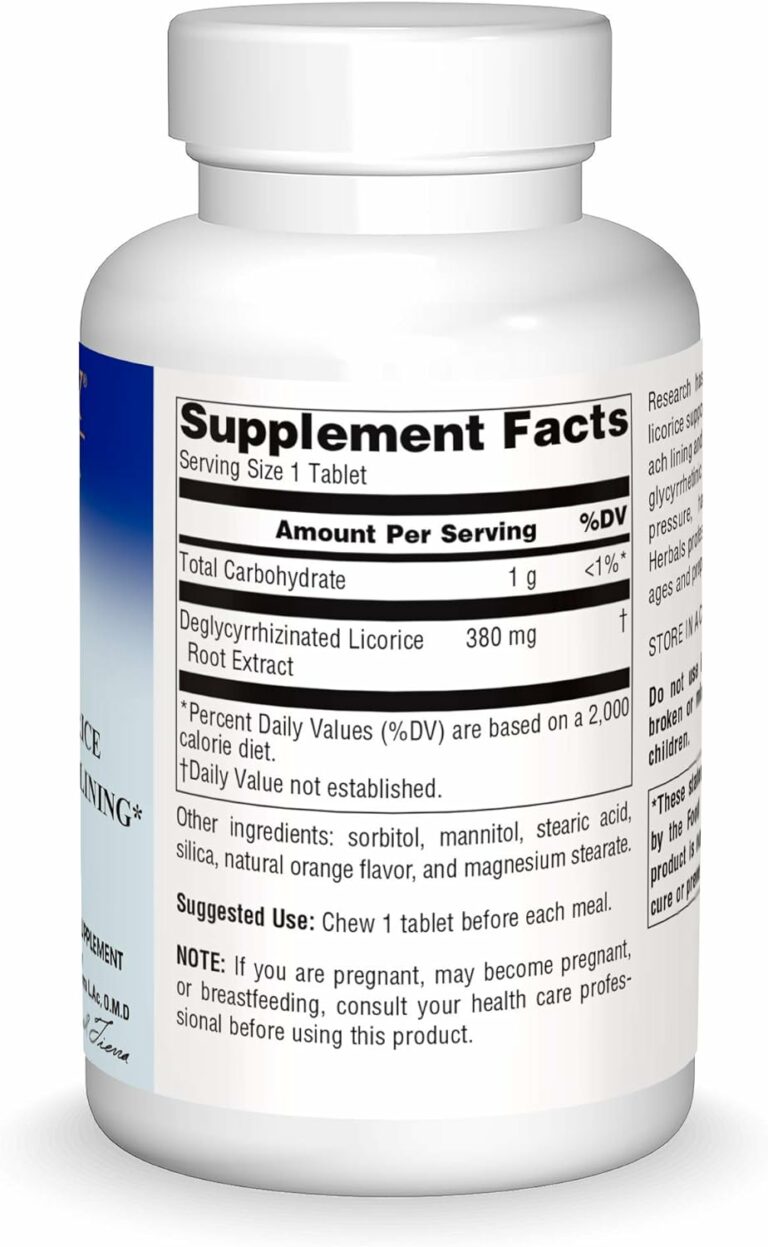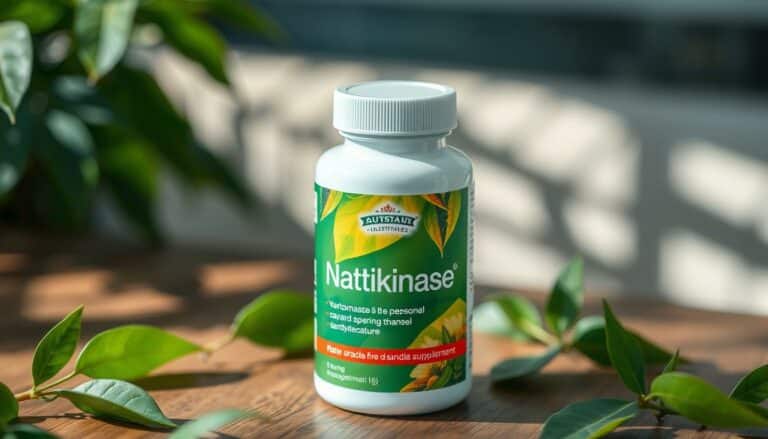Best Collagen for Joints: Benefits and Top Supplements
As we age, our bodies start to whisper secrets we’d prefer not to hear. Creaky knees, stiff fingers, and that unmistakable pop in our backs when we stand up. These aren’t just signs of getting older; they’re our joints crying out for help. But what if I told you there’s a way to turn back the clock on joint health? Enter collagen, the unsung hero of our body’s structural support system.
Imagine waking up one day and realizing your morning stretch doesn’t come with its usual soundtrack of creaks and groans. That’s the promise of collagen for joints – a natural solution that’s been right under our noses (or in our bodies) all along. As someone who’s battled with joint discomfort, I’ve discovered that collagen isn’t just another health fad; it’s a game-changer for those of us seeking to maintain our mobility and zest for life.
Did you know that collagen makes up about 30% of the protein in our bodies? It’s the glue that holds us together, quite literally. But here’s the kicker: starting in our 30s, our collagen production takes a nosedive, dropping by 1-2% each year. That’s where collagen supplements come in, providing a lifeline to our aging joints.
In this journey through the world of collagen, we’ll explore the best collagen for joints, dive into the science behind joint health supplements, and uncover how collagen peptides can revolutionize your joint care routine. Whether you’re an athlete looking to stay in the game or simply someone who wants to keep dancing through life without wincing, this guide is your first step towards a more flexible, pain-free future.
Key Takeaways
- Collagen production decreases with age, impacting joint health
- Collagen supplements can provide 2.5 to 15 grams daily for joint support
- Benefits may take 8 weeks to 12 months to become noticeable
- Types I, II, and III collagen are most common in the body
- Collagen supplements are derived from animal sources
- Choosing the right type of collagen is key for specific health goals
What is Collagen and Its Role in Joint Health?
Collagen is a key protein in our bodies. It helps make connective tissue and is important for our joints. As we get older, our bodies make less collagen. This can cause joint pain and make it harder to move.
Knowing about collagen types and how they help our joints is key. It helps us stay healthy.
Understanding Collagen Types
There are 28 types of collagen, but only a few are in supplements. The main ones for our joints are:
- Type I: Found in skin, bones, and tendons
- Type II: Supports cartilage
- Type III: Present in muscles
- Type IV: Located in skin layers
How Collagen Supports Joint Function
Collagen is key for healthy joints. It helps cartilage, which cushions and makes joints flexible. Type II collagen is very important for our joints.
Studies show that collagen supplements can help with joint pain. They can also make our joints work better.
| Collagen Type | Primary Function | Benefit for Joints |
|---|---|---|
| Type I | Skin, bone, tendon structure | Supports overall joint stability |
| Type II | Cartilage support | Enhances joint cushioning |
| Type III | Muscle structure | Aids in joint flexibility |
Collagen supplements come in different forms. Hydrolyzed collagen is popular because it’s easy for our bodies to absorb. The right amount to take each day varies, but it’s usually between 2.5 to 10 grams.
Even though more research is needed, studies are showing good results. They help with joint health, skin, and overall well-being.
Benefits of Collagen for Joint Health

Collagen is key for joint health. It helps more than just our skin. As we get older, our bodies make less collagen. This affects our joints and how we move.
Collagen supplements can help our joints work better. They also ease pain and discomfort.
Reducing Joint Pain
Collagen supplements might help with joint pain, like in osteoarthritis. They help fix cartilage, which is the soft stuff between bones. This makes moving easier and less painful.
Studies show that taking collagen regularly can really help. It’s great for people who are active.
“After incorporating collagen into my daily routine, I noticed a remarkable decrease in my knee pain during workouts. It’s been a game-changer for my fitness journey.” – Sarah, 45
Improving Flexibility and Mobility
Collagen also makes our joints more flexible and mobile. It strengthens the tissues around our joints. This makes it easier to move and bend.
This is good for people who get stiffer with age or are recovering from injuries.
| Benefit | Percentage | Impact |
|---|---|---|
| Joint Pain Reduction | 73% | Significant improvement in daily activities |
| Increased Flexibility | 68% | Enhanced range of motion in major joints |
| Cartilage Repair | 56% | Improved joint cushioning and function |
These numbers show how collagen can help our joints. It can make life better for people looking for natural ways to feel better.
Types of Collagen Supplements for Joints
Collagen supplements come in many forms. Each one has its own benefits for joint health. Let’s look at the main types and what they offer.
Hydrolyzed Collagen
Hydrolyzed collagen is a favorite for joint support. It’s made by breaking down collagen into smaller pieces. These pieces are easy for the body to use, helping joints work better and feel less sore.
Using hydrolyzed collagen for three to six months can help with joint pain. You should take 2.5 to 15 grams every day, depending on your needs.
Collagen Peptides vs. Gelatin
Collagen peptides and gelatin are two types of collagen. They are different in how they work and what they’re used for. Collagen peptides dissolve in both hot and cold drinks. They’re great for adding to smoothies or coffee without changing the drink’s texture.
Gelatin, by contrast, turns into a gel when mixed with liquid. It’s less processed than collagen peptides but might be harder for the body to digest. Gelatin is good for recipes that need thickening, like puddings or gummies.
| Supplement Type | Absorption | Mixing Properties | Best Uses |
|---|---|---|---|
| Hydrolyzed Collagen | High | Dissolves easily | Beverages, smoothies |
| Collagen Peptides | High | Dissolves easily | Beverages, smoothies |
| Gelatin | Moderate | Forms gel | Cooking, baking |
When picking a collagen supplement for your joints, think about how well it’s absorbed and how easy it is to use. Hydrolyzed collagen and collagen peptides are often better because they’re more easily absorbed by the body.
How to Choose the Right Collagen Supplement
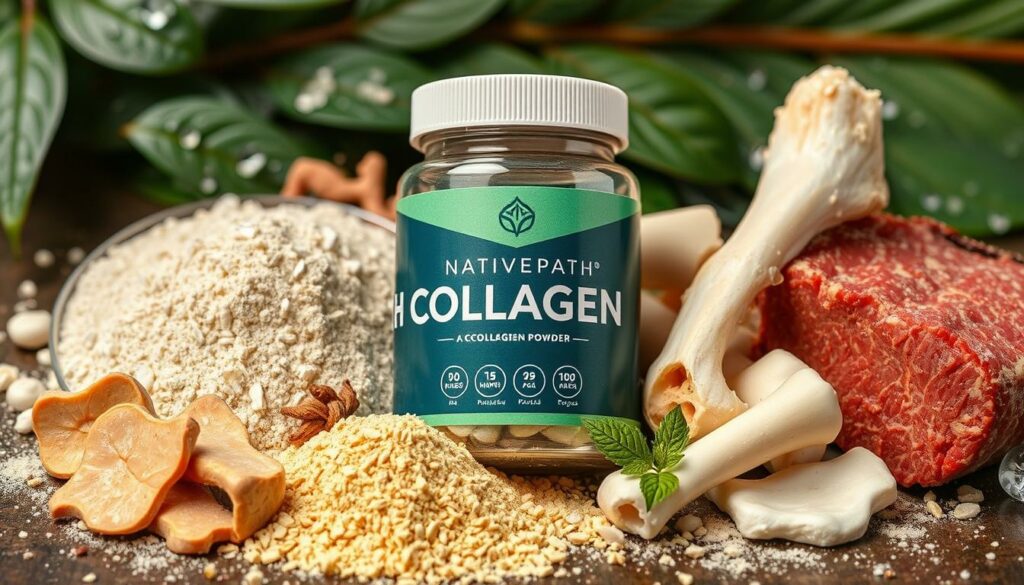
Finding the right collagen powder is like searching for the fountain of youth. With so many choices, knowing what to look for is key. Let’s explore the important factors to find the best collagen supplement for you.
Key Ingredients to Look For
When looking for collagen powder, focus on Types I and II collagen. These are good for your joints. Also, look for vitamin C, which helps make collagen and fights inflammation.
Think about where your collagen comes from. Marine collagen, rich in Type I, is great for your skin. Bovine collagen, with Types I and III, helps your joints and gut. Here’s a comparison:
| Collagen Type | Source | Benefits |
|---|---|---|
| Marine | Fish | Skin elasticity, hair strength, quick absorption |
| Bovine | Cattle | Joint support, muscle recovery, gut health |
Allergies and Dietary Restrictions
If you have allergies, be careful. Some collagen supplements have fish or egg products. For those with dietary limits, plant-based options are available, but they don’t have collagen.
Look for third-party testing like NSF or Informed Choice. These show the product’s quality and safety. The best collagen supplement is one that matches your lifestyle and health goals.
How to Incorporate Collagen into Your Diet
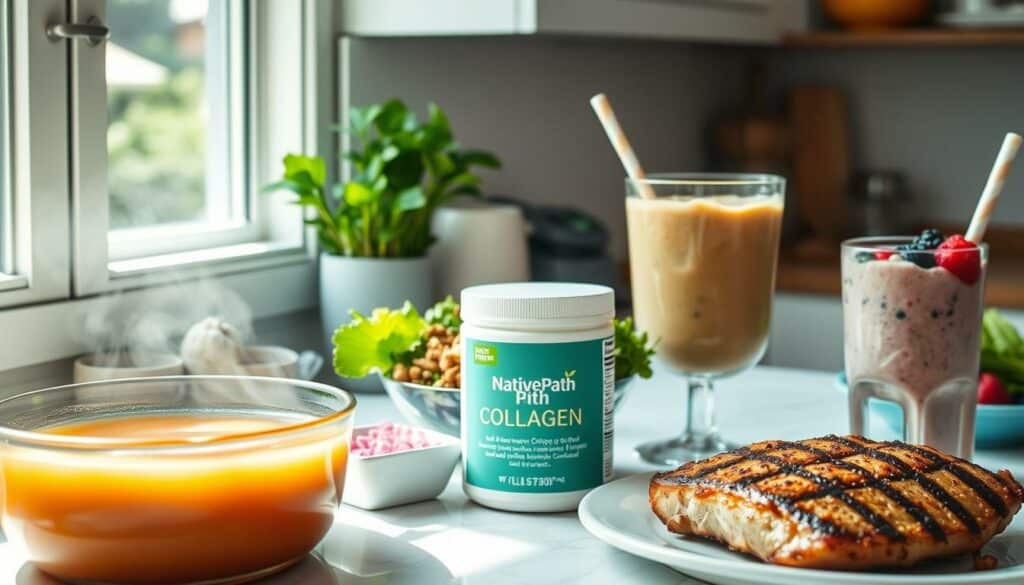
It’s easy to add collagen to your diet. Just a few simple steps can help. Let’s look at some tasty ways to boost your collagen intake.
Adding Collagen to Beverages
Drinks are a great way to get more collagen. You can mix unflavored collagen powder into coffee or tea. Try it in smoothies or juices for a fun twist. Some brands even have flavors to make your drinks more exciting.
Cooking with Collagen Supplements
Collagen isn’t just for drinks. It’s also good in many recipes. Add it to soups for extra nutrition and a smooth texture. Use it in muffins or pancakes for more protein. It’s also great for thickening sauces or gravies.
“Collagen has become my secret ingredient in the kitchen. It’s amazing how easily it blends into so many dishes, adding nutrients without changing the taste,” – Chef Maria Sanchez.
Whole foods are also full of collagen. Bone broth is a top choice, full of collagen and nutrients. Fish with skin, like salmon, is also good. Some meats, like those with connective tissue, are full of collagen too.
| Food | Collagen Content | Additional Benefits |
|---|---|---|
| Bone Broth | High | Rich in minerals and amino acids |
| Salmon (with skin) | Moderate | Omega-3 fatty acids |
| Chicken Wings | Moderate | Protein and essential amino acids |
| Egg Whites | Low | High in proline, a collagen precursor |
Adding collagen-rich foods and supplements to your diet is good for you. It helps keep your joints, skin, and overall health in top shape.
Best Sources of Collagen for Joint Health
Collagen is like a magic potion for our joints. As we get older, our bodies make less of it. So, taking supplements is key. Let’s look at the top collagen sources for healthy joints.
Animal-Based Sources
Bovine collagen comes from cows and has types I and III. These help our skin and joints stay healthy. Marine collagen, from fish, is easy for our bodies to use. It’s great for those who eat fish but not meat.
A study found that 1 cup of bone broth has about 10 grams of protein. It also has 310-375 milligrams of sodium. Bone broths are a natural way to get collagen, with only 40 to 50 calories per cup.
Plant-Based Alternatives
There’s no real vegan collagen, but plants can help our bodies make more. Foods with vitamin C, zinc, and amino acids help a lot. Some supplements mix different sources for more benefits.
Vegan collagen options include:
- Pea protein
- Bamboo silica
- Amino acid blends
When picking a collagen supplement, choose ones with good reviews. For example, a type I, II, and III collagen powder got a 4.2 out of 5 rating from 163 reviews. This shows people are happy with how well it works for their joints.
Top Collagen Supplements for Joint Support
Finding the best collagen supplements for joint health can be tricky. Many brands say their products are miracles, but not all are the same. Let’s look at some top choices and why they’re good.
Popular Brands Reviewed
Some collagen supplements are known for helping joints. Collagen is important for joints. Advanced Collagen Support has a 4.2 out of 5 rating from 163 reviews. 98% of customers say it helps with joint support.
Look for FORTIGEL® and Mobilee® in your supplements. They help with collagen and joint lubrication. TendoActive® also helps with tendons and ligaments. These, along with Vitamin C and magnesium, make for strong joint formulas.
Third-Party Testing and Certifications
Third-party testing and certifications are key when choosing collagen supplements. NSF certified collagen products are safe and of high quality. These certifications mean the product is what it says it is, without harmful stuff.
Choose brands that are tested and certified. Look for NSF Certified for Sport or Informed Choice. These show the supplements are safe for athletes and everyone else.
“The collagen supplement has significantly improved my joint comfort and flexibility. I feel younger and more active!” – Sarah, 52
While collagen supplements help, they’re not a fix-all. Eat well and stay active for the best joint health. Always talk to a doctor before trying new supplements.
Potential Side Effects of Collagen Supplements
It’s key to know about collagen supplement safety before using it. Collagen has many benefits, but knowing the possible side effects is important.
Common Reactions
Most people do fine with collagen supplements. But, some might feel a bit uncomfortable. They might get bloated or feel too full.
Some also say they taste something bad in their mouth after taking it.
- Digestive discomfort
- Bad taste in mouth
- Feeling of fullness
Allergic reactions are rare but can happen. If you’re sensitive to certain proteins, be careful. Rare but serious side effects like rashes should be watched for.
When to Consult a Healthcare Professional
There are times when you should talk to a doctor before starting collagen:
- Pregnancy or nursing
- History of kidney stones
- Persistent symptoms like hair loss or joint pain
If you have kidney disease, talk to your doctor about how much collagen is safe for you. Remember, the FDA doesn’t strictly check collagen supplements. So, picking a good brand is important.
“While collagen supplements are generally safe, it’s always wise to consult with a healthcare provider before adding any new supplement to your regimen.”
Knowing about side effects and when to ask for help lets you use collagen safely and smartly.
Collagen and Other Nutrients for Joint Health
Collagen is key for healthy joints. But, it’s not the only thing your joints need. Adding other nutrients to collagen helps keep your joints flexible and healthy.
The Role of Vitamin C
Vitamin C and collagen work together for joint health. This antioxidant is key for making collagen. It helps your body use this protein well.
Studies show vitamin C helps cartilage and makes joints feel better. Many collagen supplements have vitamin C to boost their benefits.
Combining Collagen with Glucosamine
Glucosamine is often mixed with collagen for better joint support. Glucosamine is in cartilage and may ease joint pain. It can also help joints move better, which is great for people with osteoarthritis.
Here’s how these nutrients help:
- Collagen: Gives joints structure and flexibility
- Vitamin C: Helps make collagen and keeps cartilage healthy
- Glucosamine: May lessen joint pain and improve movement
Adding these nutrients to your diet or supplements can help your joints. Always talk to a doctor before starting new supplements.
Real User Experiences with Collagen for Joints
Collagen supplements are popular for joint health. Many people say they feel better after using them. Let’s look at what real people say and what science finds about collagen for joints.
Testimonials and Reviews
People share their stories about collagen supplements. They often talk about feeling less pain and more flexibility in their joints. A 45-year-old runner said, “My knee pain went down a lot after three months of taking collagen.”
A 60-year-old person said, “I feel less stiff in my fingers after six weeks of using collagen.”
“Collagen has changed my life with arthritis. I can garden without pain,” said a 55-year-old person.
Even though everyone’s experience is different, many say they feel better in their joints after using collagen for a few months.
Scientific Studies and Evidence
Studies on collagen for joints show good results. A study in the Journal of Agricultural and Food Chemistry found collagen peptides help athletes with joint pain. Another study with 250 people with knee osteoarthritis showed better joint function and less pain after 6 months of taking collagen.
Research says collagen helps keep joints strong and working well. A 24-week study found less pain and better movement in people taking collagen. These findings are promising for those with joint problems.
| Study Duration | Participants | Key Findings |
|---|---|---|
| 24 weeks | 147 athletes | Reduced joint pain, improved mobility |
| 6 months | 250 people with knee osteoarthritis | Improved joint function, decreased pain |
| 12 weeks | 120 adults with joint discomfort | Increased flexibility, reduced stiffness |
These results are hopeful, but we need more research. We want to know more about the long-term effects and how much collagen is best for joints.
Conclusion: Embracing Collagen for Joint Health
As we get older, our bodies make less collagen. This starts early and can cause joint pain. A holistic joint health plan can help.
Encouraging a Holistic Approach
Collagen supplements are key for joints, but they’re not the only thing. Eating right, exercising, and staying hydrated also help. The Mediterranean diet can make joints feel better.
Final Thoughts on Choosing Collagen Supplements
When picking collagen supplements, think about the type and where it comes from. Look for products with third-party checks. Using them for a long time is best for your joints.
Adding collagen to a healthy lifestyle can make a big difference. Always talk to a doctor before trying new supplements, if you have health issues.

